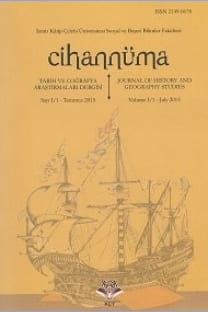Birinci Dünya Savaşı Öncesinde Reuters ve İmparatorluk Yönetimleri: Bir Örnek Çalışma
Reuters and the Goverments before The World War I: A Case Study
Empire, Havas, Public Opinion, Wolff's Reuters,
___
- Archival Documents
- Churchill Archive: CHAR 13/1/37–39, 29 Nov. 1911–30 Nov. 1911.
- Reuters Archive, RA: 1/8714059 LN 238, 1/8911601 LN 462.
- The United Kingdom National Archives, NA: HD 3/97, HD 3/109.
- Secondary Sources
- Basse, Dieter, Wolff’s Telegraphisches Bureau 1849 bis 1933. München: K.G. Saur, 1991.
- Boyd-Barrett, Oliver, The International News Agencies. London: Constable, 1980.
- Boyd-Barrett, Oliver and Terhi Rantanen, “The Globalization of News.” In The Globalization of News. Edited by Oliver Boyd-Barrett and Terhi Rantanen. London: Sage Publications, 1998.
- Collins, Henry M., From Pigeon Post to Wireless. London: Hodder and Stoughton, 1925.
- Fenby, Jonathan, The International News Services: A Twentieth Century Fund Report. New York: Schocken Books, 1986.
- Frédérix, Pierre, Un Siècle de Chasse aux Nouvelles de l’Agence d’Information Havas a L’Agence France-Presse (1837-1957). Paris: Flammarion, 1959.
- Jones, Roderick, A Life in Reuters (London: Hodder and Stoughton, 1951).
- Keyserlingk, Robert, Media Manipulation: The Press and Bismarck in Imperial Germany. Montreal: International Publishers Representatives, 1977.
- Koloğlu, Orhan, Havas-Reuter’den Anadolu Ajansı’na, Osmanlı’da Basın Teknikleri ve Araçları. Ankara: Çağdaş Gazeteciler Derneği Yayınları, 1994.
- , Osmanlı Döneminde Basın Teknikleri ve Araçları. İstanbul: İstanbul Üniversitesi İletişim Fakültesi Yayınları, 2010.
- Lefebure, Antoine, Havas: Les Arcanes du Pouvoir. Grasset: Paris, 1992.
- Miller, Gregory D., The Shadow of the Past: Reputation and the Military Alliances Before the First World War. New York: Cornell University Press, 2012.
- Nalbach, Alexander Scott, “’Poisoned at the Source?’ Telegraphic News Services and Big Business in the Nineteenth Century,” Business History Review, vol. 77, no.4 (Winter 2003).
- , The Ring Combination: Information, Power and the World News Agency Cartel. PhD Dissertation, University of Chicago, 1999.
- Packer, Ian, Liberal Government and Politics, 1905-15. New York: Palgrave Macmillan, 2006.
- Paine, S.C.M., The Sino-Japanese War of 1894-1895: Perceptions, Power, and Primacy. New York: Cambridge University Press, 2006.
- Palmer, Michel B., “Crieurs et Diffuseurs de Journaux: Perspectives Françaises et Britanniques, 1860-1900.” In La distribution et la Diffusion de la Presse, du XVIIIe Siècle au IIIe Millénaire, edited by Gilles Feyel. Paris: Editions Panthéon-Assas, 2002.
- , Des Petits Journaux aux Grandes Agences: Naissance du Journalisme Moderne (1863-1914). Paris: Aubier, 1983.
- , “L’agence Havas, Reuters et Bismarck: L’échec de la Triple Alliance Télégraphique (1887-1889).” Revue d’histoire diplomatique, vol. 90, 1976.
- Read, Donald, The Power of News: The History of Reuters. Oxford: Oxford University Press, 1999.
- Rantanen, Terhi, Foreign News in Imperial Russia: The Relationship between International and Russian News Agencies, 1856-1914. Helsinki: Federation of Finnish Scientific Societies, 1990.
- Silberstein-Loeb, Jonathan, The International Distribution of News. New York: Cambridge University Press, 2014.
- Storey, Graham, Reuters’ Century, 1851-1951. London: Max Parrish, 1951.
- Taylor, Alan J., The Struggle for Mastery in Europe 1848-1918. Oxford: Oxford University Press, 1954.
- Totman, Conrad, A History of Japan. Oxford: Blackwell Publishing, 2005.
- Zagare, Frank C., “The Moroccan Crisis of 1905-1906: An Analytic Narrative.” Peace Economics, Peace Science and Public Policy, vol. 21, Issue 3 (August 2015).
- ISSN: 2149-0678
- Yayın Aralığı: Yılda 2 Sayı
- Başlangıç: 2015
- Yayıncı: İzmir Katip Çelebi Üniversitesi
Selanik Mevlevîhânesi (Evkâfı ve Yönetim Sorunları)
Osmanlıda İcâreteynin Başlangıç Tarihi Meselesi: İlk Uygulamalara Dair Tespitler
Habsburglar Kara Eflak’a Gelirse: Vidin’de Hayvancılık Sektörünün Dönüşümü (1695-1740)
Mukayeseli Perspektif Zaviyesinden Safevî İranı’nın İnkırazı (Safevîler, Osmanlılar ve Babürlüler)
Japonya’da Doğu Tarihi ve Orta Doğu-İslâm Araştırmaları Kapsamında Osmanlı Araştırmaları
Dersaadet Birinci Osmanlı Numune-i Terakki-i Ziraat Anonim Şirketi ve Faaliyetleri
Lubb et-Tevârîh’te Harezmşâhlar’a Dair Bilgiler
Orta ve Yeniçağda Van Gölü’nde Gemi Yapımı, Taşımacılık ve Ticaret
Birinci Dünya Savaşı Öncesinde Reuters ve İmparatorluk Yönetimleri: Bir Örnek Çalışma
